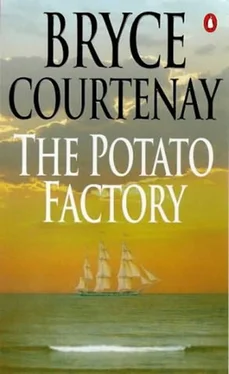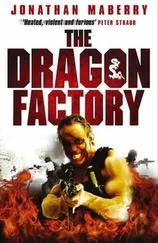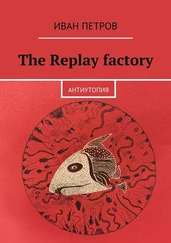Occasionally, in a moment of sentimentality, he thought fondly of Mary, though he harboured no future ambitions for a reunion with her. He told himself he wished only for a future life as a rich man, a life far removed from any he had previously led, and he was determined not to bring any of the past into his future. Though it may be said that every heart on earth is kindled to love, Ikey had so early in his life been denied affection that he was dulled to its prospect. He had never felt the singular need to love. He felt he had loved Mary, if only briefly, but he had no notion of what he might expect from such an emotion. He did not care if he himself were liked, for he had come to expect the opposite. Now that the sycophancy on which he depended as a rich man was no longer available to him, he fully expected that he would be greatly disliked. That he himself should be loved was not a thought which ever entered his head. And so Ikey's feelings for Billygonequeer were hard for him to understand, and filled him with apprehension.
Almost every day as he laboured at the cart he would decide to ignore the black man on his return to the prison that night. But he was never able to do so. Billygonequeer would smile at him, his gleaming white teeth filling his astonishing coal-black face, and Ikey, inwardly cursing himself for his foolishness, would be off to Mr Dodsworth for liniment and cloth.
Ikey, as was his natural manner, talked to Billygonequeer at great length. To this torrent of words Billy would sometimes grunt, or smile, adding little more than sounds and nods to this one-way dialogue. Occasionally Billy would clutch Ikey's hand or pat him on his face and say, 'Good pella, Ikey.' Then he might grin and repeat, 'Much, much, good pella, Ikey.' It was as though, by Ikey's mannerisms and the few words Billy had at his disposal, he could grasp what his companion was saying.
Sometimes Billygonequeer would hear a bird cry and say aloud its Aboriginal name until Ikey could pronounce it clearly. He'd gather fruit or nuts, or grub for roots, and always share what he found. Ikey got used to the fat white grubs Billy would find under the bark of fallen trees and found them delicious when roasted. Whenever they came upon wild honey they would feast on it secretly for days. In these ways Billy supplemented their prison diet with bush tucker, and there were some days on the road gang when the four men on the cart counted their stomachs more full than empty. It was a wondrous thing to see Billy's willingness to share everything he found, and the smallest wild morsel would be meticulously divided.
Ikey had spent his life in acquisition, sharing as little as possible, and keeping as much for himself as he could. It would be nice to think that Billygonequeer might have changed this aspect of his nature, that the primitive savage could teach Ikey the highest achievement of civilisation, the equitable sharing of the combined resources of any society.
Alas, this is not the lesson Ikey took from the black man. Instead he came to realise that it was this very characteristic which would lead to the ultimate demise of the Van Diemen's Land savage. The rapacious white tribe who were arriving in increasing numbers, not only as convicts but also as settlers, wanted to own everything they touched. They slashed and burned the wilderness so that they might graze their sheep and grow their corn. They erected fences around the land they now called their own and which henceforth they were prepared to defend with muskets and sometimes even their lives. They built church steeples and prison walls and homes of granite hewn from the virgin rock and timber cut from the umbrageous mountain forests. They possessed everything upon the island, the wild beasts that grazed upon its surface, the birds that flew over it, the fish that swam in its rushing river torrents and the barking seals resting in the quiet bays and secluded inlets. Everything they thought worthwhile was attached to the notion of ownership.
Against this urgent and anxious desire for appropriation stood a handful of savages who seldom even built a shelter against the weather. They dressed in a single kangaroo skin, and believed that all they could see and walk upon was owned by all who moved across the land, and yet by none. A people who did not comprehend that one person could own, or wish to own, more than any other.
Ikey understood at once that the Aboriginal tribes in Van Diemen's Land must surely perish because they lacked the two things that had made human progress possible, the existence of greed and the desire to possess property. Ikey understood acquisition as the only guarantee of his survival. He saw that Billygonequeer's people were doomed, for they had not learned this fundamental lesson. Without the need to own there is no need to compete and an uncompetitive society can only exist if it is allowed to develop in isolation. For Billy's people, the isolation had come to an end.
Ikey was aware that Billygonequeer probably did not understand what he was saying, but he said it nonetheless. He would talk as he cleaned Billy's wounds and rubbed salve into his back. 'You must become like us, you must learn our ways, your ways are over, my dear!' Ikey would repeat this over and over, but all he got from Billygonequeer was a big smile. A big white smile in a very black face and always the same response.
'You good pella, Ikey!'
It was not three weeks after Billygonequeer had taken his place again beside Ikey on the cart when Harris began to suffer stomach pains. He would be shouting at the prisoners, or simply walking along, when suddenly he would grab at his stomach, doubling over with pain as each spasm came to him.
The road gang did not need to be told that he was dying. 'Harris's gone queer,' they'd say gleefully among themselves. A month later the overseer was dead, and it was rumoured that all the same symptoms, self-laceration of the stomach and howling in the manner of Billygonequeer, were in attendance at his death bed. Furthermore, the coroner conducting the autopsy could find no fault with his stomach and intestines.
The gang was now working too far from Richmond Gaol to return at night so they proceeded from a new out station, a series of rough buildings erected beside the road. These were infested with lice and fleas, with the addition of other vermin when the weather grew colder. A new overseer, James Strutt, who had come out from Launceston, proved not too harsh by the standards of the day, dealing with trouble only when he found it.
It was from Strutt that Ikey first learned the true extent of the range war which was being waged against the island's native people. Strutt was a member of a part-time militia unit, formed independently of the government troopers, and he spoke with great enthusiasm of the tactics to be employed in the killing of blacks. He had been a member of the Black Line in October the previous year, and spoke disparagingly of the bumbling manner in which this manoeuvre had been conducted. The Black Line was a government sponsored operation intended to drive the Aboriginals out of the settled areas. The plan was to drive the blacks south and east towards East Bay Neck, through the Forestier Peninsula, and into the Tasman Peninsula, where it was proposed a permanent Aboriginal reserve would be set up.
The task force consisted of two thousand men, five hundred of these soldiers, seven hundred convicts and eight hundred free settlers and involved a thousand muskets and three hundred pairs of handcuffs. Three weeks later this avenging army returned having captured one old Aboriginal man and a young boy.
Strutt dismissed the operation as an example of how not to go about the task of eliminating the blacks. 'Government and soldier be not the way. It be a question of us agin them, free men agin savages and, by God, we'll settle it soon enough!' he'd boast.
Читать дальше












